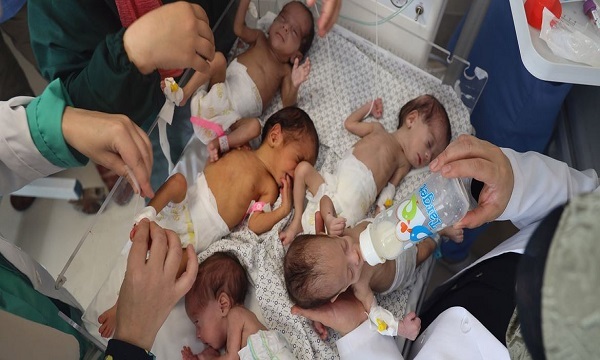
TEHRAN (defapress) - The United Nations Population Fund (UNFPA) has issued a dire warning over the effects of hunger on Palestinian mothers and children in Gaza as a result of "Israel's" genocide.

In an X post, it said: “According to doctors, it has become increasingly common for premature and low-weight babies to be born in Gaza”.
It added that “malnutrition poses a great danger to pregnant women and newborns, leading to an increase in stillbirths, low-weight babies, and children suffering from wasting and delayed growth," as it called for a ceasefire because it “is the solution to save their lives.”
The Government Media Office in Gaza had earlier declared that 3,500 more children were at risk of dying from malnutrition and starvation, and 34 children had already starved to death. This announcement prompted the UNFPA's warning.
A team of UN experts sounded the alarm in early July, accusing "Israel's" "starvation campaign" of killing Palestinian children in Gaza.
10 United Nations experts released a statement “that Israel’s intentional and targeted starvation campaign against the Palestinian people is a form of genocidal violence and has resulted in famine across all of Gaza,” noting that the complete blockade on water, food, fuel, and medicine delivery contributed to the famine.
Last month, the head of the World Health Organization, Tedros Adhanom Ghebreyesus, stated that the WHO welcomed the UN Security Council resolution adopted Monday for a ceasefire in Gaza.
Speaking from the WHO headquarters in Geneva, in a media briefing concerning global health issues, Ghebreyesus urged "all parties take steps to implement the resolution immediately, and bring a permanent end to the suffering of millions of people."
Ghebreyesus explained that a significant portion of Gaza now faces "catastrophic hunger and famine-like conditions. Despite reports of increased delivery of food, there is currently no evidence that those who need it most are receiving sufficient quantity and quality of food."
More than 8,000 children under the age of five have been identified and treated for acute malnutrition, including 1,600 with severe acute malnutrition.
Due to instability and an absence of access, only two stabilization centers for critically malnourished patients are operational, he noted.
"Our inability to provide health services safely, combined with the lack of clean water and sanitation, significantly increase the risks for malnourished children," he added, citing that there have been 34 deaths from malnutrition, including 28 affecting children under the age of 5.
Source: Al Mayadeen